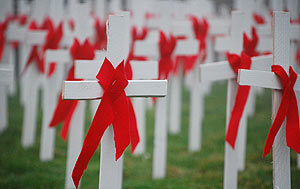A few months before we marked last year’s World Aids Day on December 1st, I made a resolution to initiate a new culture of dialogue among my family members, where we could openly talk about HIV/Aids and its related stigma. I was so determined to contribute to the struggle against the scourge and cut down its prevalence rate that has left many young people orphaned and widowed as it sweeps across the world, taking with it thousands of lives each hour that passes.


A few months before we marked last year’s World Aids Day on December 1st, I made a resolution to initiate a new culture of dialogue among my family members, where we could openly talk about HIV/Aids and its related stigma.
I was so determined to contribute to the struggle against the scourge and cut down its prevalence rate that has left many young people orphaned and widowed as it sweeps across the world, taking with it thousands of lives each hour that passes.
Just to be sure my initiative evolved into a complete network, I decided to go electronic and put to good use the internet given its speed and ability to reach out to many people simultaneously.
I got my laptop and took almost an hour to compose what seemed like a very stimulating email highlighting the needs to work together, support each other in order to manage HIV/Aids and its stigma.
The email was immediately sent out to about 30 of my family members including opinion leaders, and sat back hoping for numerous positive replies. Guess what!
I did not receive a single feedback on the issue, and even those who dared a reply only wished me a Merry Christmas or Happy New Year, but were very careful not to mention anything on the topic- HIV/Aids and its stigma.
Bizarre as it may seem, not many people would dare to laugh at us as very few families have a dialogue on HIV/Aids on their menu for that regular daily or evening talk though, the unit is supposed to play a ceremonial central role in forming good behavior especially among the young.
Family leaders continue to take advantage and sexually abuse vulnerable young ones, instead of taking up the mantle to fight against such vices that lead to HIV/Aids.
Even where the discussion ventures into that direction, it’s only in passing as members point accusing fingers at neighbours, friends who are suspected of being HIV positive, but we rarely engage in open dialogue even at family level to advise each other, initiate support for those already suffering.
It is time the high HIV infection rate stopped being just a statistic for health planning. We need to realize that the number may include a family member who died, is about to die, is living with or may get infected with HIV/Aids any second, any time.
That is the small but relevant figure that makes up the 2,925,000 and 66,000 people recorded in 008 to be on antiretroviral therapy in sub-Saharan Africa and Rwanda respectively, or the 33.4 million people infected with AIDS worldwide, according to UNAIDS 2008 statistics.
Many of you may have heard about that famous formula, ABC, which stands for Abstinence, Be Faithful and Condomise. Now experts have also realized, I hope not too late, that ABC may not be very effective against the HIV/Aids scourge without a vital supporting role of an extra ‘D’ for Dialogue.
A good number of us have failed to abstain, remain faithful or use a condom, which therefore calls for a new formula.
All people need to feel free, open up and talk about HIV/Aids as the best option of reducing its stigma and prevalence.
We need to create a community that supports and not condemn its members who are trying or need information on the need to go for HIV tests, while those already infected need to be counseled and supported by those near (like their families and friends) in order to have hope for the future.
HIV positive mothers need to be counseled by close relatives to have hope that medical professionals and counselors can help her to live positively and enable her unborn son not acquire the virus if prescriptions that prevent mother-to-child transmission of HIV/Aids are taken. This is what families are for.
As the region marks the twentieth year since the first discovery of an HIV/Aids case in Africa, there is need to reflect on the effectiveness of the strategies being employed to fight against the scourge.
As we stick to male circumcision in order to reduce the risk of HIV infection, let’s also take the struggle back to the family unit where members are taught values and respect.
A place where all members are free to advise, engage and support each other, the best unit in the community where traditional norms and morals are instilled and nurtured.
Without this strategy, I believe the billboards on the street may not deliver that meaningful message to the crowd mixed with adolescents, sex addicts or moral degenerates who roam the streets looking out for their next victim. Who knows, the next victim could be your sister, brother, daughter, nice or wife.


